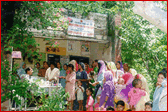District Action Plans
In its endeavour to considerably decrease the total fertility rate (TFR) and to enhance the reproductive health of women in the state of Uttar Pradesh, SIFPSA has been implementing several innovative strategies. Experi- ence with family planning programme implementation has clearly indicated that a single strategy for the whole state will not succeed because use of contraception is an extremely personal issue and one that is inextricably interwoven with an individual's socio-religious beliefs. Another lesson learned is the need for developing and involving the private sector for awareness generation and advocacy leaving the govern- ment to gear up its service delivery system.
SIFPSA recognizes that, to be really effective, reproductive health strategies must become area specific, taking into account the peculiar needs, problems and priorities of different sections of the community. Such strategies have their roots in decentralized participatory planning whereby all the stakeholders in the district from both the public and private sector, pool their collective wisdom and experience and commit themselves to a specific action plan. In March 1998, SIFPSA launched 6 District Action Plans (DAPs) as a pioneering experiment in this direction. The districts selected were Aligarh, Allahabad, Meerut, Rampur, Sultanpur and Varanasi.
Formulated after a district level workshop, each DAP entailed district level programme implementation and fund management through an autonomous society the DIFPSA under the chairmanship of the District Magistrate. SIFPSA set up a Project Management Unit (PMU) in each district to support DIFPSAs and to act as a monitoring and problem-solving unit.
The DAP intervention demarcated clear-cut strategies to ensure that existing resources in the district were channelised to create positive synergy. The performance of the DAPs was evaluated after one year of implementation and the results have been encouraging. By the end of the first year, in 6 DAP districts, 800 religious leaders attended meetings on FP, 4,500 pradhans attended training programmes, all workers in private and public sectors were imparted interpersonal counselling skills training, 792 female workers received IUCD insertion training, 1,128 integrated RCH camps were conducted and 28 NGO projects as well as 3 dairy.
Cooperative projects covering a population of 17.9 million were implemented. The family planning performance of the DAP districts improved considerably. Sterilization performance in these districts improved by 38.5 percent in two years and services were provided to around 400,000 contraceptive users.
Realistic planning, close monitoring and district ownership have contributed to the gains in performance of the DAP districts. Since this model has given good results, SIFPSA has decided to extend the DAP approach to all 29 districts in phases.
In four of these,viz. Agra, Bareilly, Firozabad and Saharanpur, workshops were held for objective setting and strategy development during January — February 2000.
The workshops were organized by the Chief Medical Officers(CMOs). They were attended by all stakeholders : key health functionaries of the district including the District Magistrate, CMO, Deputy CMOs, Medical Officers In Charge (MOICs), District Health, Education and Information Officer (DHEIO), representatives from leading NGOs and other private institutions; functionaries of development departments like cooperatives, panchayati raj, & resource persons from SIFPSA The workshops had been so designed that participants were first briefed on the latest district specific data on FP and MCH indicators which revealed the unmet need for family planning & maternal & child health services. This was followed by a presentation by the CMO on the status of public health facilities and personnel available, revealing gaps in infrastructure and service delivery.
Once these presentations were made, the participants divided into smaller groups for more in-depth discussion on the objectives and strategies required to achieve them. Each district specific plan was then written up, detailed operational plan drawn up, budgeted and funded by SIFPSA. These DAPs have started from 1 December, 2000.
Other Links
- Assessment of training needs
- Curriculum developement
- Selection of master trainers
- Selection and upgradation of training sites
- Selection of lead trainers
- Training of lead trainers
- Training of ANMs / LHVs at upgraded clinic sites
- Practice on pelvic models
- Actual IUCD insertion to clients under observation
- Distribution of IUCD insertion kits and gloves
- Follow-up in the field by RFWTC staff
- Reorientation training during follow-up
- Certification of ANMs / LHVs as performing to standard

Get in Touch with us
(Uttar Pradesh), INDIA
E-Mail : info@sifpsa.org
Phone :(91 - 0522) 2630902,997,741,896,899,894
Fax :
Site Manage by : MARG Software Solutions
2016 © SIFPSA All Rights Reserved
Number of Visitors

